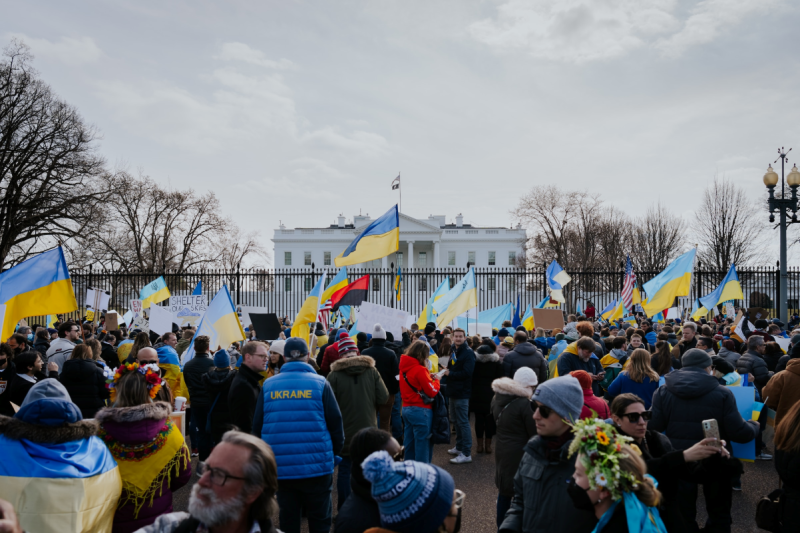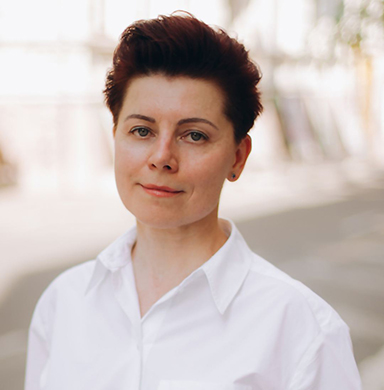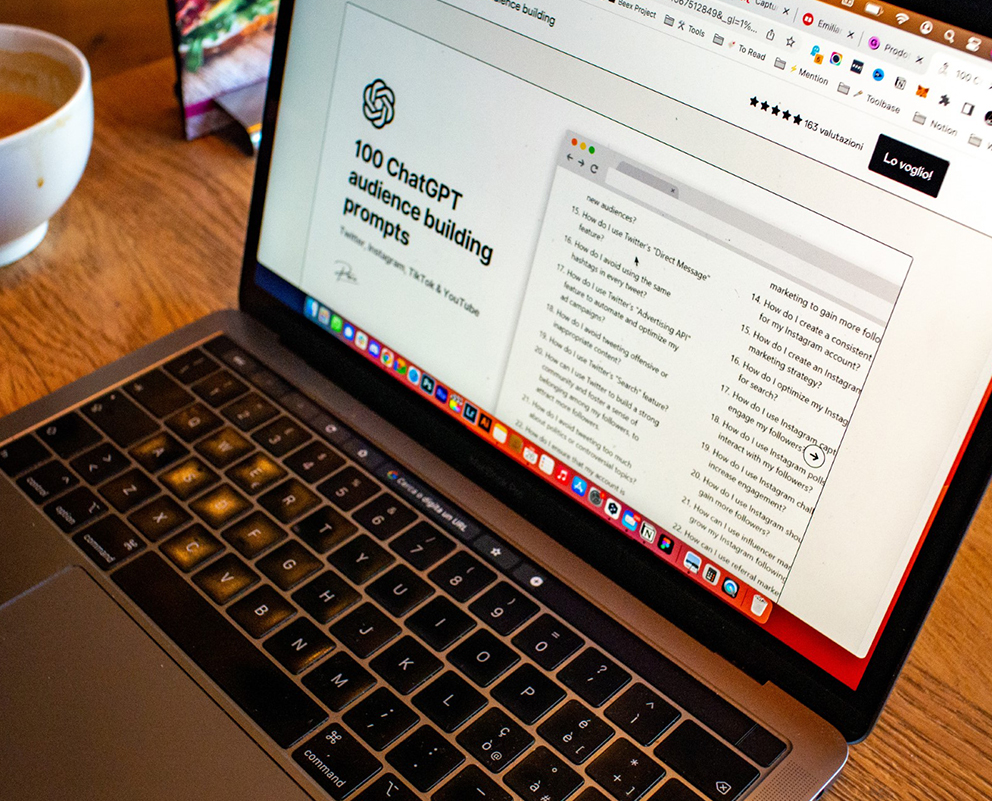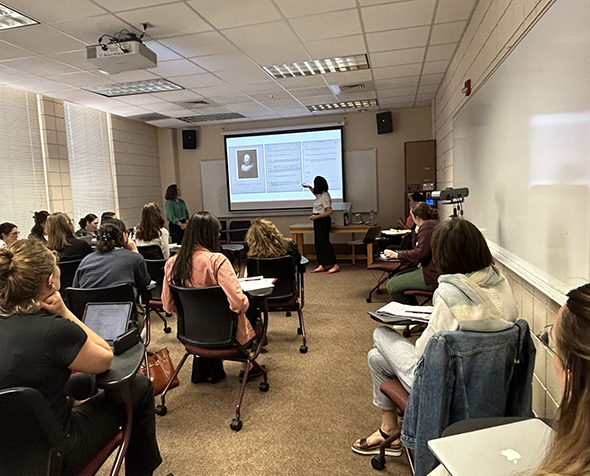Fulbright Scholar Dives Deep into U.S. Image of Ukraine Amid War, Presidential Election

The formation of Olena Fomenko’s personal and professional identity mirrors the evolving narrative arc of her beloved Ukrainian homeland and continues to inspire her groundbreaking inquiry into the power of nation branding.
Raised in Vinnytsya, a city in west-central Ukraine, Fomenko was an undergraduate studying English and Spanish at what is now called Kyiv National Linguistic University when the Soviet Union collapsed in 1991.
Although Fomenko initially sought employment with western companies searching for applicants fluent in English and other languages, a newspaper ad for a faculty position at Taras Shevchenko National University of Kyiv caught her attention. Fomenko landed the job, unexpectedly launching a career in academia and later earning a PhD in linguistics.
“My thesis on American political discourse of the late 20th century was the first and only purely linguistic research focused on what American political discourse in relation to the whole Soviet space meant in the 1990s,” she explained.
She taught English to students majoring in other disciplines before joining and later chairing the Department of Foreign Languages in the School of Journalism. She concurrently worked as director of the university’s English Language and Information Center before assuming her current role as associate professor in the Department of Language and Stylistics, where she researches the intersection of critical discourse analysis, sociolinguistics and cultural studies.
As a 2023-24 Fulbright scholar in the Department of Media, Film & Journalism Studies (MFJS), Fomenko will study Ukraine’s evolving image in the U.S., including political discourse leading up to the U.S. presidential election.
Opening Her Eyes to a New Way of Teaching and Learning
Fomenko’s appreciation for the multidisciplinary, collaborative approach to higher education prevalent in the United States stems from a Fulbright scholarship in gender studies at the University of Wyoming in 2001-02.
“It showed me a different world and was one of the most important experiences of my professional career,” she said.
Having grown up and attended university in what was then the Soviet Union, the immersion in American culture offered a unique opportunity “to be a faculty member and to study along with students, observing all of these different teaching methodologies and techniques.”
The experience instilled a refreshing sense of “academic community and true academic values,” she added. “It completely changed the way I teach.”
Delving into the Facets of Ukrainian Nation Branding
Back in Ukraine, while searching for a new research topic in 2009, Fomenko reviewed her list of published works and realized she’d been unknowingly studying nation branding from a linguistic perspective all along.
“I had always been fascinated by how language shapes reality and can create different national narratives,” she said.
She became increasingly captivated by the topic “and a little skeptical about whether you can package and sell a nation like a soap. It’s much more complicated to create an image of a country through all possible media, including things like sports discourse, the Olympics and political communications.”
To delve deeper, Fomenko started examining how Ukraine communicated a sense of national identity about 10 years ago, concentrating on messages told through the naming of places such as cities, streets, metro stations and monuments, as well as cultural icons.
“A cultural icon must have emotional significance,” she explained.
Cultural icons anchor and differentiate nations, can have positive or negative connotations and include public figures like Volodymyr Zelensky or President Joe Biden, places like Kyiv or Washington, D.C. and galvanizing events like the invasion of Ukraine in 2022 or 9/11.
“Flags are strong cultural icons,” Fomenko said. “During times of crisis and wars like we now have in Ukraine, cultural icons represent Ukraine’s resistance, unity and national identity, playing a crucial role in the perception of Ukraine in the minds of Americans and shaping political discourse.”
Fomenko points out that Ukraine launched a nation-branding campaign in April 2022 after Russia invaded Ukraine in February 2022 “and the message was that Ukraine was brave.”
But a country’s image is much more comprehensive and complex.
Now Ukraine is looking more broadly at how the country is perceived on the other side of the globe, “asking what is the role of media in communicating that image and how has media coverage of Ukraine abroad changed since Russia invaded Ukraine last year,” Fomenko said.
Researching Ukraine’s Evolving Image in the United States
In her current role as a Fulbright scholar in MFJS, Fomenko will focus on answering those questions, drawing on theories of social identity, national identity, nation branding and cultural and critical discourse analysis.
“I believe that the messages that are communicated about Ukraine are so powerful,” she said. “When people are proud of their country, like we are, when a country is communicating that strong brand across media channels — social media, media stories, national media, global media — then people are doing their job.”
The multidisciplinary study will collect, interpret and contrast three types of data, beginning with analyzing U.S. media portrayals of Ukraine. It will also specifically look at representations of Ukraine in the upcoming U.S. presidential election. The topic of Ukraine already grabbed center stage in the first Republican primary debate and will certainly continue to arise as both parties’ candidates compete for voters over the coming year.
The second data set will study how names are used to represent Ukraine in public spaces in the U.S. and whether that usage has changed. Finally, the study will gather and analyze associations Americans have with Ukraine through free association testing to reveal how mass media have influenced people’s perceptions of Ukraine.
“Americans have become much more aware of Ukraine since the Russian invasion last year but right now, no one really knows what Ukraine’s image in the United States is and that’s what I want to find out,” Fomenko said.
Her research carries high-stakes potential.
"As Ukraine continues to fight for its independence and territorial integrity, its struggle against Russian aggression is highly dependent on international support,” said Nadia Kaneva, MFJS associate professor and director of the master’s degree program in Media and Public Communication.
According to Kaneva, “Dr. Fomenko's research can provide urgent insights into the way public narratives and perceptions can have real life-and-death consequences in the context of war."
Fomenko’s scholarship will also entail delivering guest lectures, workshops, seminars and meetings with students.
She relishes the opportunity to grow professionally through her Fulbright fellowship at MFJS.
“I’m passionate about my research and writing and doing what I love in this vigorous university environment,” she said. “I feel very privileged, honored and humbled to be given this experience and hope to take a lot back with me to make changes in Ukraine.”
Fostering Global Collaboration, Communication through Fulbright Scholarships
MFJS Associate Professor and Chair Derigan Silver considers the department’s success at bringing Fulbright scholars to DU a testimony to the international research conducted by its faculty members.
“We are incredibly excited to welcome Dr. Fomenko as our second Fulbright scholar to DU in the last two years,” he said. “MFJS faculty are recognized around the world as leaders in their fields and scholars are eager to be part of our community. We look forward to Dr. Fomenko broadening our understanding of communication theory and research with her international perspective.”
Last years’ MFJS Fulbright Scholar Vojtech Dvorak, a doctoral candidate in social studies at Masaryk University in the Czech Republic, studied the impact of participation in community newspapers on the lives of unhoused people in Denver while working on a PhD in media and journalism studies.
His hands-on research included facilitating a weekly newswriting group at the St. Francis Center, a shelter and resource hub for people experiencing homelessness in downtown Denver.
“I learned how uncertain and constantly changing this effort is, reflecting the everyday life of people experiencing homelessness,” Dvorak said. “But more importantly I learned how important and empowering it can be for those who decide to take part in a community newspaper, even if their work never gets published.”
This school year, MFJS also welcomed Fulbright Student Haydee Ducay-Fajardo, who earned a degree in communication from the University of the Philippines Baguio in 2019 and subsequently worked in public relations and advertising agencies before serving as an information officer for the Philippines Department of Budget and Management.
As an MFJS Fulbright scholar, she will pursue a master’s degree in Media and Public Communication with a concentration in strategic communication while researching the integration of public participation in the budgetary process.






